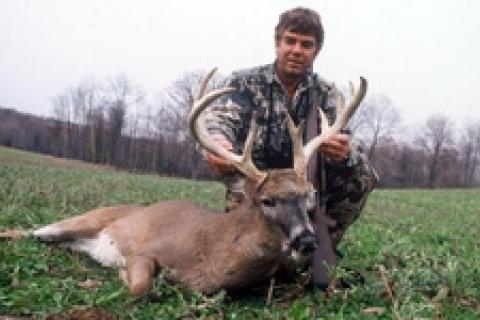
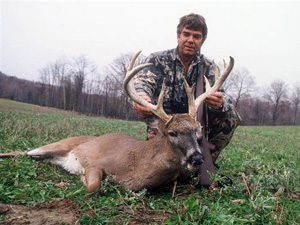 Ask a camp full of hunters how many ever had a hunt ruined because the deer smelled them and spooked before they could get a shot off. How many hands do you think would go up? The answer to that is simple: Virtually every person in the room. No other single sense of the whitetail is more likely to spoil a hunt than the sense of smell.
Ask a camp full of hunters how many ever had a hunt ruined because the deer smelled them and spooked before they could get a shot off. How many hands do you think would go up? The answer to that is simple: Virtually every person in the room. No other single sense of the whitetail is more likely to spoil a hunt than the sense of smell.
A buck might see something that looks out of place or potentially threatening to him if you move while he's in range. Or he may hear a sound that alarms him if you step on a branch. In both cases he will likely go on alert, but seek a second confirmation that the movement or sound was dangerous before fleeing. That momentary pause often gives you just enough time to make the shot.
Not so with his olfactory sense. One whiff of human scent and any buck more than a year old is outta there. That's how he survived multiple hunting seasons.
To give you an idea of just how good a deer is at scenting us, consider these facts. A human nose has about 5 million olfactory receptors. A dog has about 220 million, enabling him to scent a bobwhite quail 80 yards away or cold track a mountain lion through dry ground. A deer's nose is even better than the canine's — it has just slightly less than 300 million olfactory receptors!
If you doubted whether scent control is important in hunting, that should seal the case.
But in spite of these facts and the preeminent importance of controlling or masking our human scent, far too many hunters ignore this important facet of deer hunting preparation. They'll wear the latest camo from head to toe. They'll brush up their blinds just so and obsess over the best caliber or bow brand. They'll be as silent as a mouse during long sits on stand. But then just make a half-hearted, token gesture at scent control. They might haphazardly spray on a scent eliminator at the last minute or squirt out a few drops of doe-in-heat urine as they walk in to the stand.
That's not enough. To be consistently successful, it's important to take a thorough, thought-out approach to preventing one's scent from spooking the quarry, whether it's a whitetail or bull elk. Today's big game hunter has such an array of odor control, masking and attracting products available that human scent reaching the quarry should rarely, if ever, be the reason for a hunt to be unsuccessful. But to make that statement true, you need to make use of at least several of the scent-focused products available. And you must do so in the proper manner. Beyond that, you need to plan your ambush location, approach to the stand or still hunting route with careful consideration of wind currents.
Before Scent Control
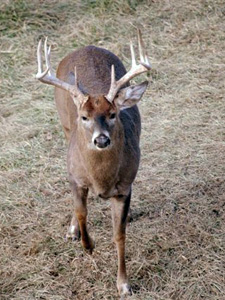 |
| Deer have slightly less than 300 million olfactory receptors — able to sniff out the slightest of foreign odors. |
The best hunters make scent-related products an insurance policy. They do that by always checking the wind before and during their hunt to insure the best likelihood that any scent on their body or gear will be blowing away from the quarry. This is true whether they are sneak hunting or waiting on a stand.
Tie a piece of sewing thread to your stand, bow or gun and watch it often or use one of the powder wind checkers frequently during the day. If the wind blows consistently the wrong way, towards the quarry, change your stand location or alter your stalking route.
The less you have to rely on scent elimination products, the better. But no matter how well you plan out the hunt and keep track of dominant wind patterns, air currents will swirl, eddy and backwash throughout the day. That's why it's imperative that you keep your scent and unnatural odors on you as negligible as possible. One hundred percent scent elimination is not achievable. But you need to reduce it as much as possible towards that goal of zero scent.
Avoiding foreign odors. For starters, a simple step is to avoid getting scents on you that are foreign to a whitetail or elk's world and might, because they are unnatural, spook them. This includes gasoline, oil, colognes, perfumes, cigarette or cigar smoke, chewing tobacco, air fresheners, scented toothpastes and other household items. Don't go into a smoke-filled room with your hunting clothes on, even if you aren't the one smoking. They'll still reek of tobacco to a deer. Also avoid strong foods such as onions and garlic and don't cook in your hunting clothes.
Using the Scent-eliminating Products
First Step: bathe and prepare your body properly. The first step expert hunters use this to stay super clean and odor free as much as possible (given the heavy clothes, warm weather and sweat-producing activity hunting requires). Shower with scent-free soaps, body washes and shampoos manufactured for hunters with scent-eliminating ingredients. These will knock out odor-causing bacteria.
After showering, use a mouth wash. Human breath can produce strong game-spooking odors. A scent-free mouth wash will help control the odor-creating bacteria. Special scent-free toothpastes are also available. Taking chlorophyll pills or chewing chlorophyll gum can also reduce breath odor. Finally, apply a scent-free antiperspirant to reduce sweating that can create game-spooking odor.
Clothing
Now it's time to get dressed. Cotton feels good on the skin, but it doesn't breathe well and encourages sweating, so choose synthetic underwear, preferably kinds that wick moisture away from the skin.
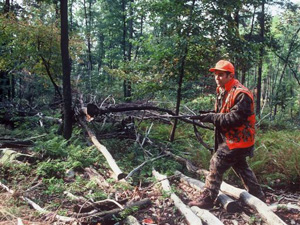 |
| Scent-control outer clothing lines help control human odors. |
A number of high-quality scent-control outer clothing lines are available to hunters. Those from Scent-Lock, Under Armour and Scent Blocker are three of the most well-known. While none can control scent 100 percent, they will go a long way towards that goal. And they control it for longer periods than earlier versions did years ago. These scent-control clothing lines will help reduce your odor, but only if used properly. Store them in a scent-free container until you are ready to start hunting. If you use carbon-based clothing, remember to run it through the dryer on high heat periodically throughout the season to recharge it. When the clothing needs washing, use scent-eliminating detergents sold for hunters.
Several companies make boots with scent control materials built in to fight foot odor. If you don't use those, spray the insides periodically with scent-removal products and allow them to dry. Other hunters prefer rubber boots which leave less scent than leather models as they walk through the woods. But these must be sprayed periodically with scent-control products as well, both inside and out.
If possible, wait until you arrive at the hunting destination to put on your outer hunting clothes and boots. Then spray down footwear and clothing before heading to the stand. If you have a long hike in, dress lightly to avoid perspiring excessively, and then cool down before putting the outer layer of clothes on. If you sweat during the hike, use a scent control wipe or field wash cloth to wipe your face and underarms down, and then store that in a zip-lock bag. Spray periodically throughout the day around the underarms, neck and feet if it's warm and you are sweating.
Cover Scents
Controlling and eliminating your human odors as much as possible and avoiding other foreign scents such as gasoline, tobacco or cologne are the most important steps for a successful hunt. But you can go one step further by using two additional products: masking or cover scents and attractant scents.
Masking Scents. If you haven't completely removed all of your human and foreign odors in your pre-hunt preparations, a masking scent can help cover it. Quick example: if you were eating deviled eggs at a picnic and a skunk walked past, would you smell eggs or skunk? Clearly the skunk smell would overwhelm the fainter smell of deviled eggs.
These products aren't as popular as they once were, but they still work extremely well. Examples include skunk secretions, fox urine and raccoon pee. All of scents that are natural to a deer's world and strong enough that they can help cover remnants of human odor that your scent control sprays, washes and clothing didn't capture or eliminate. The scents of these animals can also have a calming effect on deer.
If you want something more palatable consider fresh dirt, cedar or pine. Just be sure to choose a product that would imitate a scent naturally found in your hunting area. You can even walk through cow dung or split an apple and rub the juices on your hat or boots to help cover your human scents.
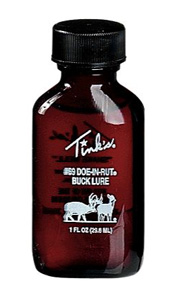 |
| Attractant scents can help attract bucks in pre- and post-rut. |
Attractant Scents. These come in two major forms. One type of attractant scent imitates food scents, the other urine and glandular secretions from does and bucks. Both are designed to draw in the quarry, playing on the instincts of hunger, the urge to breed, or the desire for power and status in the herd. Both of these types of attractant scents can also to some extent act as masking scents.
Doe in rut scents and plain doe urine attract a buck whose testosterone level is high and is ready to breed. Scents using tarsal gland secretions play on a buck's territorial instincts and challenge his status in the herd.
The packaging and formats of these offerings are too diverse to go into detail on here. Experiment with several of the better known brands, ask your hunting buddies what works for them and go from there. Soon you'll find a product you have confidence in. That in itself is a big step towards success.
Sometimes bucks might ignore the attractant scents you place out. I've particularly found food attractant scents mediocre producers. But doe-in-estrous scents can at times be extremely effective. Even if they ignore your doe-in-estrous scent three-fourths of the time and respond to it 25 percent of the time, that's the kind of odds I'll take. Seeing a nice buck on every fourth hunt sounds like a good bet to me.
So any time from the pre- to post-rut, an attractant scent is well worth putting out. They are sort of in the "can't hurt, but might help" category. That makes them well worth trying in my books virtually any day in November, or December and January in the deep South and Texas.
So there you have it. First off, watch the wind like a hawk and change your hunting location if necessary. Control your human scent and avoid picking up unnatural odors such as gas, smoke and strong foods. Wash your clothes, hair and body in scent-control products and spray down with scent-reducing products. Add a masking scent for good measure, and during the breeding cycle use doe-in-estrous products to attract testosterone-charged bucks. Follow this regimen and chances are you won't hear the depressing sound of a buck snorting and stomping away through the underbrush because he smelled you just out of range.
- 10565 views

